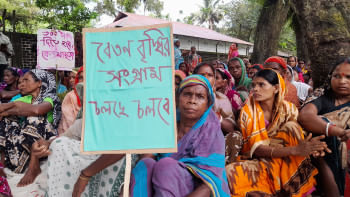Tea workers deserve better wages

We support the section of tea workers who vowed to continue their movement for a daily minimum wage of Tk 300 after trade unions called off the strike on Saturday afternoon, following government assurance that the daily wage would be raised from Tk 120 to Tk 145. The hike is a win more for tea garden managers than workers, who are justified in thinking that it is insufficient. A strike may be a disruptive practice from an economic point of view. But it remains the only way for the poor workers to get their message across to the authorities, who are seldom persuaded by quieter voices.
Reportedly, workers of about 166 tea estates, including those in Sylhet and Chattogram, enforced the strike since August 13. These people are among the poorest and most marginalised communities in Bangladesh. Yet, for eight days, they chose to abstain from work which, according to the chairperson of Bangladeshi Tea Sangsad (Sylhet), caused "huge losses". In reality, the workers had to suffer a great deal more. They had to forgo wages for each day they were away from work. Each day spent in protesting made them poorer than the day before. It took enormous courage to still go on, and to still want to continue without the backing of trade unions, because, frankly, they have been pushed to the wall.
It is the government's responsibility to establish rules of fair trade for the tea workers and their employers, who must come out of their colonial mentality to exploit the former.
Officially, about 74 percent of tea workers live in poverty, according to a 2018 study by Bangladesh Bureau of Statistics. Even if you feel inclined to take a BBS statistic with a pinch of salt, it still is a huge number. Their precarity was made worse by the insanely high prices of daily essentials in the country. Thus, the proposed Tk-25 increase is not proportional to the rise in their expenses. It follows a historic pattern of exploitation in which workers are forced to serve their "masters" in exchange for a pittance. Although they are given some benefits in the form of housing, food rationing and primary healthcare, these facilities are not enough to complement their poor wages, nor does everyone have access to them. While talking to The Daily Star, workers described their miseries including uncertainty over job regularisation, shrinking scope for outside work, generational poverty, etc. As one expert has pointed out, the tea communities are also protectors of the 25 percent of our forest area, and thus merit special consideration.
We think tea workers need fair treatment more than special treatment, and it starts with determining a proper value for their work. And it is the government's responsibility to establish rules of fair trade for them and their employers, who must come out of their colonial mentality to exploit them. They should look at the additional cost of fair wages as part of a move to restructure the industry. Currently, Bangladesh is the 10th largest tea producer in the world, yet in 2020, it ranked 61st in tea exports, indicating that the sector has lost its export competitiveness. Clearly, it needs modernisation and diversification, and it needs motivated workers for that. We urge the authorities to use the present crisis as an opportunity to advance the sector, and give workers better incentives to realise that vision.


 For all latest news, follow The Daily Star's Google News channel.
For all latest news, follow The Daily Star's Google News channel. 






Comments